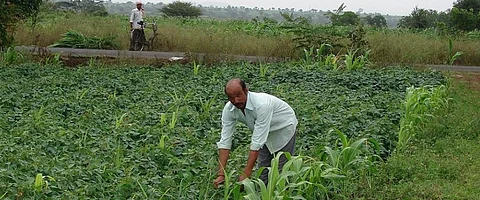

India is home to 30 per cent of the total organic producers in the world, but accounts for just 2.59 per cent (1.5 million hectares) of the total organic cultivation area of 57.8 million hectares, according to the World of Organic Agriculture 2018 report.
At the same time, most organic farmers are struggling due to poor policy measures, rising input costs and limited market, says a study by the Associated Chambers of Commerce and Industry of India (ASSOCHAM) and global consultancy firm Ernst & Young.
Organic farming is yet to taste success
Problems are evident even in Sikkim, which was recognised as the country’s first organic state in 2018. A survey by Delhi-based Centre for Science and Environment shows that the state's transition to organic farming is yet to become a true success. The survey found that the phasing out of chemicals in Sikkim was not complemented by a simultaneous increase in availability of and access to organic manure.
Farmers also complained of low productivity during the transition from conventional chemical farming to organic farming. Pest attack on organic crops is another reason cited by the farmers for low productivity and demanded education and training to deal with it. The problem of pest attacks increased after the conversion to organic farming, but the state is yet to maintain data on this, which is needed for plant disease management.
Similarly, nearly 98 per cent farmers in Rajasthan are aware of ecological hazards of conventional chemical-based farming, but fear of decline in production and unavailability of organic inputs in the market discourage them from switching to organic farming, says a 2015 study conducted by the Consumer Unity and Trust Society.
Organic farming fraught with hurdles
According to the Indian Council of Agricultural Research, productivity on an average dips by 6.7 per cent in the first year, and the government needs to have a plan in place to support farmers during the transition. The report on Doubling of Farmers’ Income by Ashok Dalwai committee, too, echoes the concern of the farmers who claim up to 30 per cent drop in yields when embracing organic. It takes about a decade to attain pre-conversion yield levels, according to the committee report.
To ensure marketing of organic produce, connecting farmers with the domestic and global supply chain is extremely important. But a new ICRIER study found the supply chain to be underdeveloped. As a result, the small and mid-sized farmers located in hilly regions and tribal belts find it extremely difficult to access the market.
Expensive organic produce discourages customers, affects sales
Even after the produce reaches the markets, consumers find them expensive and discouraging. Rs 1,200–1,500 per month is the additional expenditure if a consumer switches to organic food, says ASSOCHAM study.
Farmers say that their organic produce are usually more expensive due to higher labour cost and comparatively lower yields. According to the ASSOCHAM report, post-harvest handling of relatively small quantities of organic foods also results in higher costs because of the mandatory segregation of organic and conventional produce, especially for processing and transportation. “Specialised farmer training costs, processing and inventory holding costs (without chemical additives), and increased packaging, logistics and distribution costs (due to low volumes), contribute to the high price of organic food products,” says the report.
Multiple certification systems
Even as farmers are struggling to find a better market, the existing certification systems for organic food are making things difficult for them. The certification systems are not only cumbersome and time-consuming, but also expensive. It is important to eliminate confusion over multiple certification systems and multiple ministries regulating organic production and sales. In fact, FSSAI is reconsidering its regulations on organic food that kicked in from July 1 this year, after farmers’ protests.
The government, meanwhile, has not done enough to address the hurdles. Paramparagat Krishi Vikas Yojana (PKVY)—the Centre’s free certification programme for organic farmers—is an example. A 2018 report on the implementation of PKVY highlights that all states, except Tripura, Odisha and Karnataka, have failed to utilise even 50 per cent of their funds under the scheme. While the Centre has increased allocation for the scheme by 44 per cent for the current year, corrective measures are needed to ensure that the states become responsible and contribute toward “organic India”.